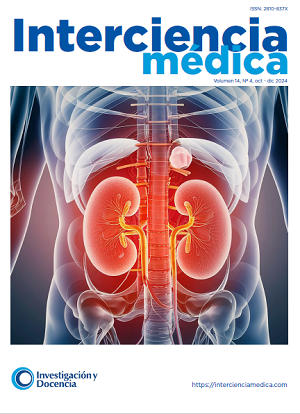Surgical complications of flexible ureteroscopy with super-pulsedThulium láser in the Urology Department of Clínica Internacional
DOI:
https://doi.org/10.56838/icmed.v14i4.227Keywords:
flexible ureteroscopy, Thulium fiber laser, postoperative complications, urinary calculi, urologyAbstract
Introduction: Urinary stone disease, characterized by the presence of calculi in the urinary tract, affects 1-20% of the
population, with a recurrence rate over 50%. Flexible ureteroscopy with thulium fiber laser (TFL) has become a preferred
method for treating urinary calculi, especially those smaller than 20 mm, offering precise lithotripsy with a high degree of
safety and efficacy. Materials and Methods: A retrospective descriptive study was conducted on 200 patients treated with
flexible ureteroscopy using TFL at Clínica Internacional between 2021 and 2023. Clinical and epidemiological characteristics
were analyzed, with a focus on postoperative complications. Results: The median age of patients was 43 years, with a male
predominance (127 males, 73 females). The average stone size was 13.84 mm. Postoperative complications included sepsis
(4.5%), ureteral stricture (5.5%), hematoma (1%), ureteral perforation (1.5%), and arteriovenous fistula (0.5%). Discussion:
Flexible ureteroscopy with TFL is effective and safe, presenting a lower complication rate (13%) compared to historical
data. The TFL’s higher energy absorption in water allows for precise lithotripsy with fewer complications and shorter
hospital stays. Conclusion: The Thulium fiber laser is a reliable and efficient option for flexible ureteroscopy, demonstrating
a high stone-free rate and minimal complications, making it a valuable tool in the treatment of urinary calculi.
Downloads
Downloads
Published
Issue
Section
License
Copyright (c) 2024 Jonathan M. Delgado Saavedra, José Luis Risco-Aguilar, Carlos Pacheco-Cahuana, Emperatriz Centeno-Martínez

This work is licensed under a Creative Commons Attribution 4.0 International License.














